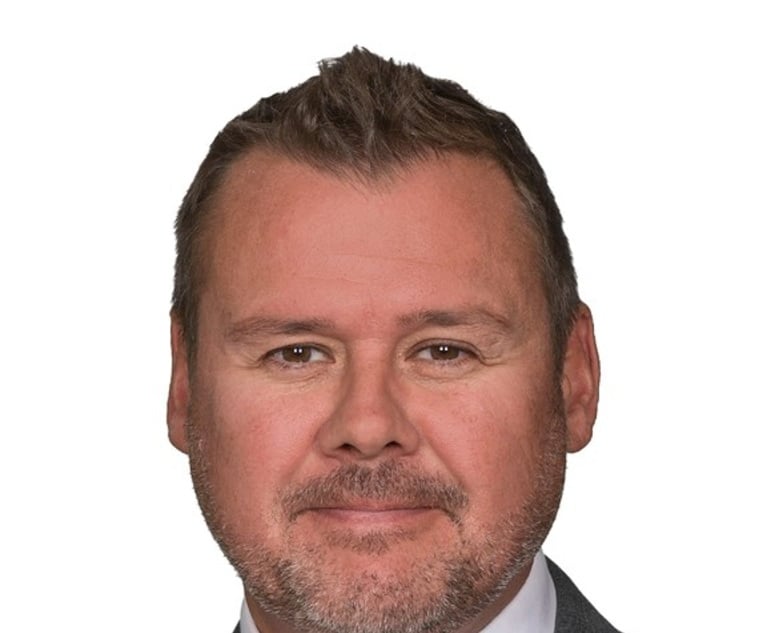What Law Firms Have Over the Big Four
Annette Kimmitt, chief executive of top-tier Australian firm MinterEllison and a former EY managing partner, says law firms can offer clients value that the Big Four can't—especially in the time of the coronavirus.
March 30, 2020 at 05:00 AM
5 minute read
As the crisis surrounding the coronavirus spreads globally, law firms are well-positioned to build on clients' trust—a value they have retained and professional services firms like the Big Four have largely lost by diversifying too much, says Annette Kimmitt, chief executive of top-tier Australian firm MinterEllison.
Kimmitt is in a position to know. She left EY in 2018 to take charge of MinterEllison as the firm's managing partner and CEO.
When Kimmitt started at MinterEllison—one of Australia's original Big Six law firms and one of only two to remain independent—the partners were having an internal debate about whether it was a law firm or a professional services firm.
Her immediate response to the idea that a law firm could match the global scale and firepower of the Big Four consulting firms was "who are you kidding?" But she says the more time she spent at MinterEllison, the more she saw that the firm had earned trust among its clients because it remained a profession with its own ethics and code of conduct.
In contrast, client trust in large accounting firms has diminished, she says, as they have become broad consulting firms.
"The Big Four have almost taken a backwards step in the position of trust," Kimmitt told Law.com International during an interview in mid-March. "What became clear really quickly is that the law firms now hold a position of independence and are linked to that trust in the minds of clients in a way that far exceeds the level held by the Big Four. "
But to retain that advantage, law firms need to do a better job of training partners to expand their skills beyond technical legal skills, she says.
After making the move to MinterEllison, Kimmit, who had been an EY partner for 14 years and started her career as an auditor before taking on global management roles, was surprised by how little the profession invested in training and developing its leaders. At EY, Kimmitt had been the beneficiary of the investment the Big Four put into leadership and management development. EY sent her to study at executive leadership programs at Harvard and the Kellogg School of Management, and provided her with extensive experiential learning, mentoring and coaching.
"It wasn't just throwing me the keys and saying, 'here, you're a really good accountant now run this part of our business,' " she said.
Kimmitt has observed that law firms are now investing more in leadership development for partners, but "it's at a much smaller scale than what the Big Four would be doing," she said.
Firms need to recognize that the skills that make a partner an eminent lawyer are not the same as those that make a great leader of the business and someone who can drive transformation, she says.
"The message we're trying to deliver internally at MinterEllison is that when our partners show up to their clients as lawyers, we have all of those skills and attributes that make people truly great lawyers," she said. "But we at times need them to take off their hat as a lawyer and put on their hat as an owner and partner in the business."
She added that lawyers need to engage more in conversations around the management, operations and future of the firm.
"We need them to bring a different set of skills to engage in some of those conversations. And most of these are learned skills," she said.
Kimmitt says MinterEllison's partners no longer debate whether the firm should be more like a consulting firm.
"The law firm is our DNA, and for as long as I'm in the chair the law firm will continue to be the central tenet of who we are," she said.
The firm is aiming for double-digit compound annual revenue growth through 2025 and will focus on seven key industries: energy and resources; healthcare and aging; financial services; education; infrastructure; real estate; and government and the public sector.
But it will also be "redefining the boundaries" of what it means to be a law firm as moves toward its 2025 goals. And it will expand its consulting services in related offerings. Among those it will offer are designing and advising on IT procurement beyond their legal and compliance aspects; offering risk consulting along with its regulatory legal practice; and providing infrastructure project management services.
It has put a 30% cap on the amount of non-legal revenue the firm will earn.
And amid the COVID-19 crisis, Kimmitt says garnering so much trust has paid off both for the firm and its clients. In fact, since the pandemic began to spread, many have sought advice from the firm that goes beyond the virus's legal implications.
"That position of trust does create opportunities for law firms to really step up and live up to that trust," she said. "It creates opportunities to build much deeper and much more enduring relationships with clients."
NOT FOR REPRINT
© 2025 ALM Global, LLC, All Rights Reserved. Request academic re-use from www.copyright.com. All other uses, submit a request to [email protected]. For more information visit Asset & Logo Licensing.
You Might Like
View All
Jenner & Block Expands London Team with Baker McKenzie Hire to Lead New Practice Area
2 minute read
Bennett Jones Securities Partner Alan Gardner Remembered as a Brilliant Lawyer & Mentor
3 minute read
Freshfields Leads European M&A Rankings Again in 2024, as U.S. Firms Gain Market Share
5 minute read
HSF Defends Bayer on Roundup Class Action as Litigation Comes to an End in Australia
2 minute readTrending Stories
- 1Attorney Sanctioned $9K for Revealing Nude Photos, Other Info in Court Filing
- 2Shifting Battlegrounds in Administrative Law, From Biden to Trump II
- 3Bar Report - Jan. 13
- 4Newsmakers: Robert Collins, Barron Wallace Elected to Bracewell’s Management Committee
- 5Navigating the Shifting Sands of E-Discovery and Information Governance in 2025
Who Got The Work
Michael G. Bongiorno, Andrew Scott Dulberg and Elizabeth E. Driscoll from Wilmer Cutler Pickering Hale and Dorr have stepped in to represent Symbotic Inc., an A.I.-enabled technology platform that focuses on increasing supply chain efficiency, and other defendants in a pending shareholder derivative lawsuit. The case, filed Oct. 2 in Massachusetts District Court by the Brown Law Firm on behalf of Stephen Austen, accuses certain officers and directors of misleading investors in regard to Symbotic's potential for margin growth by failing to disclose that the company was not equipped to timely deploy its systems or manage expenses through project delays. The case, assigned to U.S. District Judge Nathaniel M. Gorton, is 1:24-cv-12522, Austen v. Cohen et al.
Who Got The Work
Edmund Polubinski and Marie Killmond of Davis Polk & Wardwell have entered appearances for data platform software development company MongoDB and other defendants in a pending shareholder derivative lawsuit. The action, filed Oct. 7 in New York Southern District Court by the Brown Law Firm, accuses the company's directors and/or officers of falsely expressing confidence in the company’s restructuring of its sales incentive plan and downplaying the severity of decreases in its upfront commitments. The case is 1:24-cv-07594, Roy v. Ittycheria et al.
Who Got The Work
Amy O. Bruchs and Kurt F. Ellison of Michael Best & Friedrich have entered appearances for Epic Systems Corp. in a pending employment discrimination lawsuit. The suit was filed Sept. 7 in Wisconsin Western District Court by Levine Eisberner LLC and Siri & Glimstad on behalf of a project manager who claims that he was wrongfully terminated after applying for a religious exemption to the defendant's COVID-19 vaccine mandate. The case, assigned to U.S. Magistrate Judge Anita Marie Boor, is 3:24-cv-00630, Secker, Nathan v. Epic Systems Corporation.
Who Got The Work
David X. Sullivan, Thomas J. Finn and Gregory A. Hall from McCarter & English have entered appearances for Sunrun Installation Services in a pending civil rights lawsuit. The complaint was filed Sept. 4 in Connecticut District Court by attorney Robert M. Berke on behalf of former employee George Edward Steins, who was arrested and charged with employing an unregistered home improvement salesperson. The complaint alleges that had Sunrun informed the Connecticut Department of Consumer Protection that the plaintiff's employment had ended in 2017 and that he no longer held Sunrun's home improvement contractor license, he would not have been hit with charges, which were dismissed in May 2024. The case, assigned to U.S. District Judge Jeffrey A. Meyer, is 3:24-cv-01423, Steins v. Sunrun, Inc. et al.
Who Got The Work
Greenberg Traurig shareholder Joshua L. Raskin has entered an appearance for boohoo.com UK Ltd. in a pending patent infringement lawsuit. The suit, filed Sept. 3 in Texas Eastern District Court by Rozier Hardt McDonough on behalf of Alto Dynamics, asserts five patents related to an online shopping platform. The case, assigned to U.S. District Judge Rodney Gilstrap, is 2:24-cv-00719, Alto Dynamics, LLC v. boohoo.com UK Limited.
Featured Firms
Law Offices of Gary Martin Hays & Associates, P.C.
(470) 294-1674
Law Offices of Mark E. Salomone
(857) 444-6468
Smith & Hassler
(713) 739-1250









